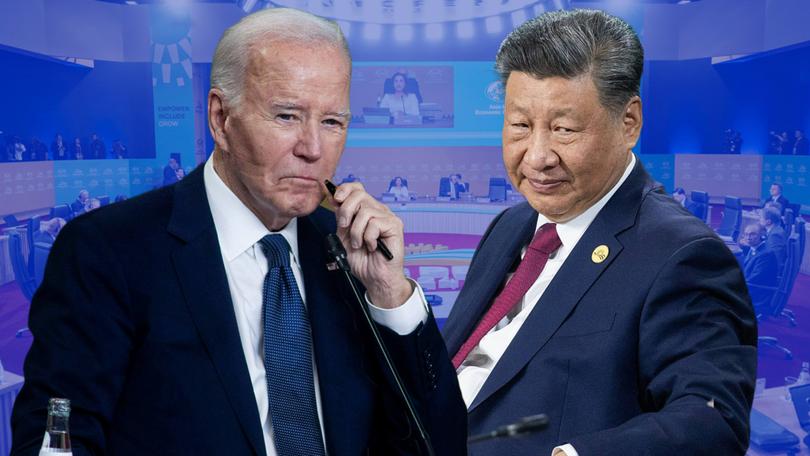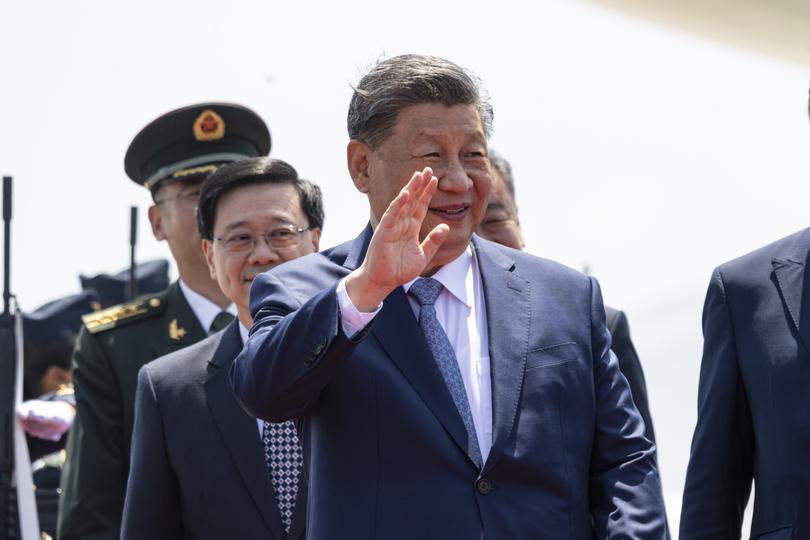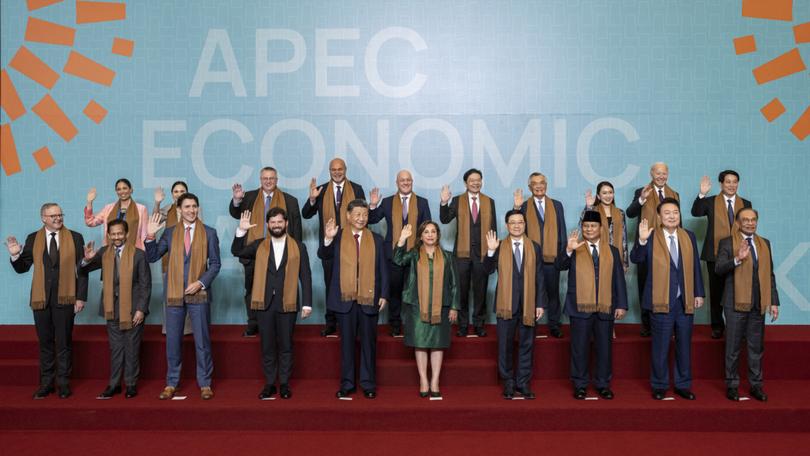THE WASHINGTON POST: Biden and Xi meet after APEC, and seem to aim cautionary comments at Trump
Joe Biden has met with his Chinese counterpart Xi Jinping one last time to cool rising tensions between their countries. But they seemed to aim their messages at a man who wasn’t in the room: Donald Trump.

LIMA, Peru - President Joe Biden and his Chinese counterpart, Xi Jinping, on Saturday met here for a final time during Biden’s presidency, exchanging pleasantries amid rising tensions and appearing to aim their messages not as much at one another as at someone not in the room: President-elect Donald Trump.
Trump has warned that he will impose a broad array of tariffs on foreign goods, specifically proposing 60 percent tariffs on imports from China. He has also nominated a number of figures for national security posts who have been hawkish on China, potentially signaling an era of less predictability in an already volatile U.S.-China relationship.
Xi warned against letting that relationship become too hostile.
Sign up to The Nightly's newsletters.
Get the first look at the digital newspaper, curated daily stories and breaking headlines delivered to your inbox.
By continuing you agree to our Terms and Privacy Policy.“If we take each other as rivals or adversary, pursue vicious competition, and seek to hurt each other, we would roil the relationship or even set it back,” Xi said as he appeared with Biden after their meeting.
“As two major countries, China and the United States should bear in mind the interest of the whole world and inject more certainty and positive energy into the turbulent world,” the Chinese leader added.
“As the world’s most important bilateral relationship, a stable China-U.S. relationship is critical not only to the interests of the Chinese and American peoples, but also to the future and destiny of the entire humanity.”
Biden and Xi met for nearly two hours in a hotel conference room toward the end of an Asia-Pacific Economic Cooperation (APEC) summit in Peru. The summit was marked by escalating worry about what Trump’s presidency would mean for international relations and alliances, and especially for the world’s two largest economies and most powerful militaries.
During the meeting, the two sides agreed that human control would be required to make any determinations on using nuclear weapons, and that artificial intelligence should not be a factor in making that call. Jake Sullivan, Biden’s national security adviser, said that Biden did not pass along messages from Trump to Xi, or vice versa.
“President Biden was not a conduit for messages going in either direction,” Sullivan said.
“He did reinforce the fact that these next two months are a time of transition in the United States, and a time when stability in the U.S.-China relationship is essential.”
Biden’s relationship with Xi has been among the most consequential of his presidency, and the leaders’ meeting carried significant personal and political meaning for the president, who has spoken more about his relationship with Xi than that of any other world leader. Senior Biden administration officials view a rising China as the biggest long-term threat that the incoming Trump administration will have to confront.
Biden, too, seemed to be talking at least in part to his successor, publicly stating that he viewed the U.S.-Chinese rivalry as something to tame rather than stoke.
“We are the most important alliance, or the most important relationship, in the entire world, and how we’re getting along together can impact the rest of the world,” Biden said
“And so our two countries cannot let any of this competition veer into conflict. That’s our responsibility, and over the last four years I think we’ve proven it’s possible to have this relationship.”
While there were critical policy reasons for Biden to meet with Xi, their encounter also carried a heavy dose of personal emotion for the outgoing president, and toward the end of their meeting they put aside their notes and had a more personal interaction.
Biden initially thought he would have four more years to manage the complex relationship, then hoped that at least his vice president could carry on his policies — only to see those hopes upended by Trump, whose disruptive approach to foreign policy Biden abhors.
Biden’s relationship with Xi dates back to when both men were serving as vice presidents of their respective countries, assigned to deal with one another in ways that their principals were not. They forged an early and unlikely connection, both institutionalists in diametrically opposed political systems.
“For over a decade, you and I have spent many hours together, both here and in China and in between,” Biden said to Xi.
“We haven’t always agreed, but our conversations have always been candid and always been frank,” he added.
“We have never kidded one another. We’ve been level with one another. And I think that’s vital. These conversations prevent miscalculations, and they ensure the competition between our two countries will not veer into conflict — be competition not conflict.”
Xi appeared to already be looking ahead to what could be a far rockier relationship with Trump. He spoke about the “fruitful dialogue” he has had with Biden, citing the risk of becoming more adversarial and pleading that “only solidarity and cooperation can help humanity overcome current difficulties.”
He added: “Small yards, high fences, is not what the major countries should pursue.”
Sullivan said that Biden expressed concern about China’s support of Russia in its war against Ukraine and about Beijing’s military activity in the South China Sea. Biden also addressed Chinese efforts to attack U.S.-based cybersecurity networks and to target officials in the Trump and Kamala Harris campaigns, which have particularly angered U.S. officials.
Friendlier topics included continued joined U.S.-China efforts to combat narcotics trafficking and reducing climate change.
The rising influence of China and Xi was visible throughout the APEC summit.

Xi’s arrival was celebrated as an official state visit, with a red carpet placed outside his airplane and before the Government Palace when he visited. Xi will also be honoured with a state visit in Brazil, where he and Biden both travel for a Group of 20 summit on Monday and Tuesday.
On Thursday, Xi and Peruvian president Dina Boluarte inaugurated the opening of the Port of Chancay, celebrating an infrastructure project that is expected to attract $3.6 billion in investment and will create a direct route from China across the Pacific Ocean to South America.
Xi wrote an opinion piece in the Peruvian paper El Peruano boasting that the port would reduce shipping costs by 20 percent, employ 8,000 people and generate $4.5 billion in additional annual income for Peru.
Biden, on the other hand, in some ways appeared like the outgoing president he is. In the photo where the leaders posed together in brown scarfs and waved to the cameras, Xi was front-and-centre next to the Peruvian president, while Biden was tucked in the back corner, between the leaders of Thailand and Vietnam.

For the meeting with Xi, Biden left his hotel and travelled to the Chinese delegation’s hotel. Sullivan said that the countries essentially switch hosting duties, and since the United States hosted Xi in California for their previous meeting, the Chinese chose the location of this one.
Ahead of the meeting, Biden administration officials, knowing they have limited time to get out their message, warned about the dire threat that they say China poses.
“If you look out at a strategic level, the competition with the People’s Republic of China is going to be defining for what the world looks like over the course of the next 10, 20 and 30 years, and so that has got to be a paramount priority for the incoming administration,” Sullivan told reporters earlier in the week.
He said that China’s aggressive behaviour in the South China Sea would need to be a point of focus for Trump officials as soon as they take office. Sullivan has yet to speak in detail with Mike Waltz, whom Trump has named as his incoming national security adviser.
“Transitions are uniquely consequential moments in geopolitics. They’re a time when competitors and adversaries can see possible opportunity,” Sullivan said.
“And so, part of what President Biden will communicate is that we need to maintain stability, clarity, predictability through this transition between the United States and China.”
Biden has devoted much of his 50-year political career to foreign policy, and he has long prided himself on his personal relationship with foreign leaders, perhaps none more than Xi.
When Biden was serving under President Barack Obama and Xi was his own country’s No. 2, they held lengthy meetings in Beijing and travelled to Sichuan Province to tour a centuries-old irrigation project. They visited a school, where Xi signed basketballs and Biden shot hoops.
When Xi made a reciprocal visit to the United States six months later, Biden toasted him at a State Department luncheon and hosted him for dinner at the Naval Observatory, the vice president’s official residence. Later in the trip, Biden met Xi in Los Angeles, where they toured a school.
Xi is also a primary character in one of the most frequent stories Biden tells, recalling a moment when he was with Xi on the Tibetan Plateau when Xi asked him, “Can you define America for me?” Biden says that he responded, “I can, in one word: possibilities.”
At one time, they referred to each other in glowing terms, but the personal warmth faded in recent years. Biden has called his onetime friend “a thug.”
“Let’s get something straight — we know each other well, we’re not old friends,” he said in June 2021. “It’s just pure business.”
Xi has called Biden “my old friend,” but his government’s signals of hostility toward the United States are unmistakable. They have been foils for one another during Biden’s presidency, especially when Biden has cast his foreign policy as an existential test of democracy vs. autocracy.
In their first meeting during Biden’s presidency, which occurred in Bali in 2022, Biden tried to open a stronger channel of communication. At the time, he was buoyed by Democrats’ better-than-expected results in the midterm elections.
This time, Biden arrived in the twilight of his political career, reeling after his party’s disappointing election results and trying urgently to communicate to his successor the importance of a firm but measured reaction to China’s aggression.
© 2024 , The Washington Post
